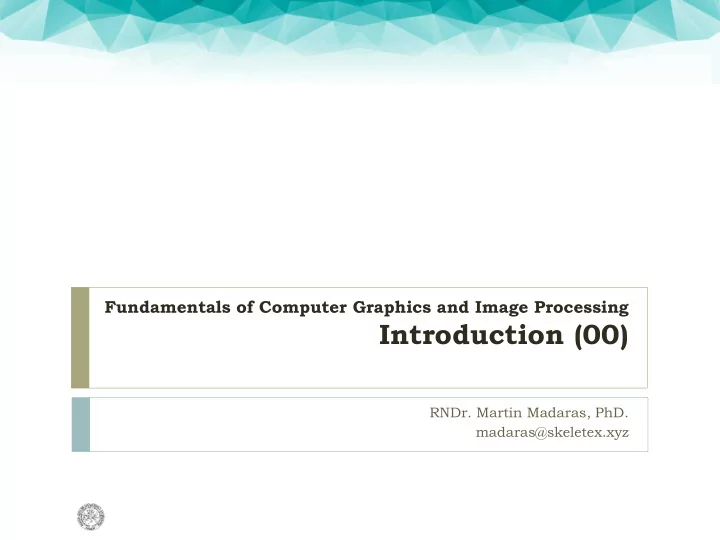

FCGIP Introduction (0) - Image Processing (1) - Image Processing (2) - Image Processing (3) - Image Processing (4) - Image Processing (5) - Introduction CG (6) - 3D Modeling Representations, Transformations, Projections (7) - Rasterization, Shading (8) - 64
FCGIP Introduction (0) - Image Processing (1) - Image Processing (2) - Image Processing (3) - Image Processing (4) - Image Processing (5) - Introduction CG (6) - 3D Modeling Representations, Transformations, Projections (7) - Rasterization, Shading (8) - Visibility, Clipping, Textures (9) - 65
FCGIP Introduction (0) - Image Processing (1) - Image Processing (2) - Image Processing(3) - Image Processing (4) - Image Processing (5) - Introduction CG (6) - 3D Modeling Representations, Transformations, Projections (7) - Rasterization, Shading (8) - Visibility, Clipping (9) - Shadows, Animations (10) - 66
FCGIP Introduction (0) - Image Processing (1) - Image Processing (2) - Image Processing (3) - Image Processing (4) - Image Processing (5) - Introduction CG (6) - 3D Modeling Representations, Transformations, Projections (7) - Rasterization, Shading (8) - Visibility, Clipping (9) - Shadows, Animations (10) - Ray-casting, Acceleration structures, Global Illumination Intro (11) - 67
FCGIP Introduction (0) - Image Processing (1) - Image Processing (2) - Image Processing (3) - Image Processing (4) - Image Processing (5) - Image Processing (6) - 3D Modeling Representations, Transformations, Projections (7) - Rasterization, Shading (8) - Visibility, Clipping (9) - Shadows, Animations (10) - Ray-casting, Acceleration structures, Global Illumination Intro (11) - WRITTEN EXAM [2 nd part, CG] (12) - 68
FCGIP Evaluation Image Processing part Practical lessons, projects from IP: 25p Oral exam from IP part: 25p Computer Graphics part Practical lessons, projects from CG: 25p Written exam during last lesson: 25p Standard evaluation from the sum of points: max 100p 69
Computer Graphics Last Lecture (13) 21.12.2019 Computer Graphics Test ? (Lectures 7 - 12) 70
Lectures vs. exam 71
Sources and literature Foley, J et. al. -- Computer Graphics: Principles and Practice, Addison- Wesley 2013, Professional, ISBN 978-0321399526 HILL, F. Computer graphics using OpenGL. Upper Saddle River: Prentice Hall, 2001. 922 s. ISBN 0-02-354856-8. ŽÁRA, J. -- BENEŠ, B. -- SOCHOR, J. Moderní počítačová grafika. Praha: Computer Press, 2005. 606 s. ISBN 80-251-0454-0. RUŽICKÝ, E. -- FERKO, A. Počítačová grafika a spracovanie obrazu. Bratislava: SAPIENTIA, 1995. 324 s. ISBN 80-967180-2-9. OpenGL Sources SHREINER, D. -- OpenGL ARB, The OpenGL Programming Guide. Addison-Wesley, 2009. s. ISBN 978-0321552624 http://www.glprogramming.com/red/ http://nehe.gamedev.net/ www.google.com 72
How the lectures should look like #2 Ask questions, please!!! - Be communicative - www.slido.com #ZPGSO00 - More active you are, the better for you! - 73
Computer Vision / Computer Graphics 74
Computer Vision/ Computer Graphics Computer Graphics Computer Vision 75
Image Processing What is Image Processing? 76
What is IP? “Any use of computers to process or manipulate images “ - “The image can be a 2D (intensity, RGB) or 3D (depth map, structured - point cloud)“ “Computer Vision uses image processing algorithms to solve tasks” - 77
Introduction What is Computer Graphics? 78
What is CG? “Any use of computers to create or manipulate images “ “The pictorial representation and manipulation of data by a computer “ 79
Goals of CG Recreating reality - convincingly Creating alternative reality Convert information into an optical form 80
Recreating reality 81
Recreating reality 82
Recreating reality 83
Alternative reality 84
Introduction What is rendered image? How do we perceive the color image on a device? 85
Frame Buffer 86
Color Mixing - Mixture of Red, Green and Blue 87
Color Display 88
Modern Displays LCD - liquid crystal display 89
Pixel PIxEL - Picture Element 90
Color Frame Buffer Each color intensity needs to be stored separately 91
Color Depth Bits per pixel determine image color depth 92
8-bit Palette Each pixel points to a color number in palette Palette is 24bit but contains only 256 colors 93
Display Resolution and Memory Frame-buffer memory size and speed as limiting factor 1024x768 24bit - 2.25 MB - 0.79 megapixels 1920x1080 24bit - 5.94 MB - 2 megapixels 4096x2160 30bit - 31.64 MB - 8.84 megapixels For animated displays we need to read the frame buffer at least 24 times per second 94
Double Buffering Q: What happens if we write directly to the framebuffer ? We need a second buffer to solve this problem 95
Aspect Ratio Display aspect ratio TV 4:3 HDTV 16:9 35mm film 3:2 Pixel aspect ratio Nowadays, almost always 1:1 96
Frame-buffer Manipulation Direct memory access, Limited by OS security policies Various graphical toolkits and libraries Often slow for complex geometry and 3D graph OpenGL and DirectX Fast but requires hardware 97
What is an image? Rectilinear 2D array of pixels - Reality Digital Image 98
What is an image? Rectilinear 2D array of pixels - Reality Digital Image 99
What is an image? Pixels are NOT little squares! Pixels are samples! - Reality Digital Image 100
Recommend
More recommend